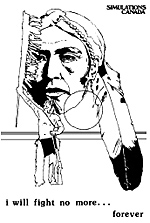
Introduction
I Will Fight No More…Forever is an attempt to portray the actions and events of the Nez Perce Campaign of 1877 in game form.
Players 2
Period American Frontier, 1877
Scale Turn Strategic: 96 hours and Tactical 15 seconds
Map 2 0 miles per hex 25 yards per hex
Unit up to 500
5 to 50 braves people or soldiers
Components
Box ziploc or 1" cardboard box
Map 22"x28" unmounted map on thick paper
Rules one 12 page 6"x9" booklet
Counters 255 die-cut and backprinted
Counter Manifest
90 Army tactical units [light blue]
49 beige Indian tactical units [beige]
28 Army strategic units [dark blue]
8 Indian strategic units [yellow]
80 Game Markers and chits [white]
SimCan says:
“A highly unusual game played on both the Strategic and Tactical levels and fully demonstrative of Indian/Army Warfare … the first major attempt at covering an entire Indian campaign in a thorough manner. The Strategic game very much centers around the Army player getting coordinated and the Indian player trying to prevent it. The Tactical games have a lot of nuance in the system.”
The Reviewer says:
“The battle board pieces really feel like handling Indian Braves and Cavalry troopers. The board would have much to gain from a third color, though, as some of the hard terrain is difficult to make out. Fight No More surprisingly misses the opportunity to have dedicated battle boards for an Army fort and town, both of which are staples of Western theme. There appear to be some unresolved rules questions on stacking … Fight No More is interesting and fast-paced, there is a lot of action and the overall impression it gives is quite satisfying. The problem of moving the Indian camp is novel … this game system would make an excellent model for an evenly matched Indian-Cavalry confrontation on an even larger scale.” --John Prados in F&M 20.
Comments
Fight No More is regarded as the best simulation (not that there are that many other designs to chose from!) of the 19 th century US-Indian conflicts. Really two games in one, it uses separate maps for Strategic and Tactical operations. A neat touch is that depending on what type of terrain (Major Mountain, Wooded Mountain, Rolling Hills, or Open Plains) that an encounter occurs, there is a separate battle map that corresponds to that type of hex. We have rules for Search that can lead to ambush, Indian Warrior Bands, Melee and Fire combat, Sitting Bull, Army Howitzers and Gatling Guns, Horses, and much more. The game ends after 29 strategic turns, or anytime after turn 25 when all the strategic Indian units have crossed the Canadian border. Victory points are awarded to the Army player for kills, surrenders, and Indian lodges captured (he loses points if the lodge is destroyed!). Indians gain VP’s for surviving units and lodges. Knowing that this is an obscure topic to most of us, Newberg thoughtfully included a full page prologue to provide gamers with some historical background. It seems that the designer really had his heart into this package.
Collectors Notes
Being a scarce game with an innovative design on an unusual subject and without much competition, Fight No More will command a hefty premium if it comes up for sale. This is one of the top collectible titles from SimCan.
Boone lists low, high and average prices of 5/36/17.80 at auction and 10/20/16.67 for sale.
Errata & Clarifications
None published.
Stephen Newberg says:
The most difficult of all military operations is the contested retreat. Every great military writer from Sun Tzu to Clausewitz agrees on this. The most famous such retreat is Xenophon’s March of the 10,000 to home. Chief Joseph’s band of Nez Perce, in 1877, retreated further, against more opposition, and over worse terrain. To make the game work, it required both an operational and a tactical level. This concept worked well and I used a form of it again later in another 19th Century game. I was, and remain, very pleased with Fight No More. It has color, suspense, action, and good history. Hard to ask more of rules, a map and die-cut counters.
Back to Simulacrum Vol. 3 No. 2 Table of Contents
Back to Simulacrum List of Issues
Back to MagWeb Master Magazine List
© Copyright 2001 by Steambubble Graphics
This article appears in MagWeb (Magazine Web) on the Internet World Wide Web. Other military history articles and gaming articles are available at http://www.magweb.com